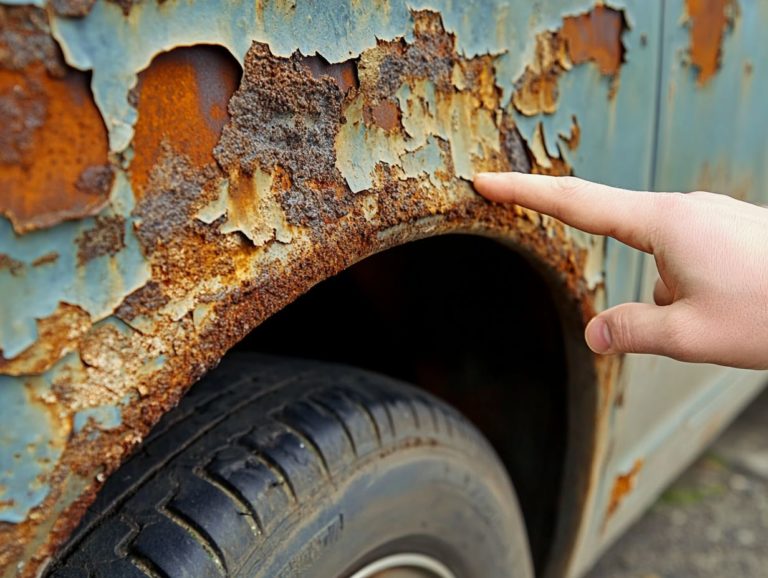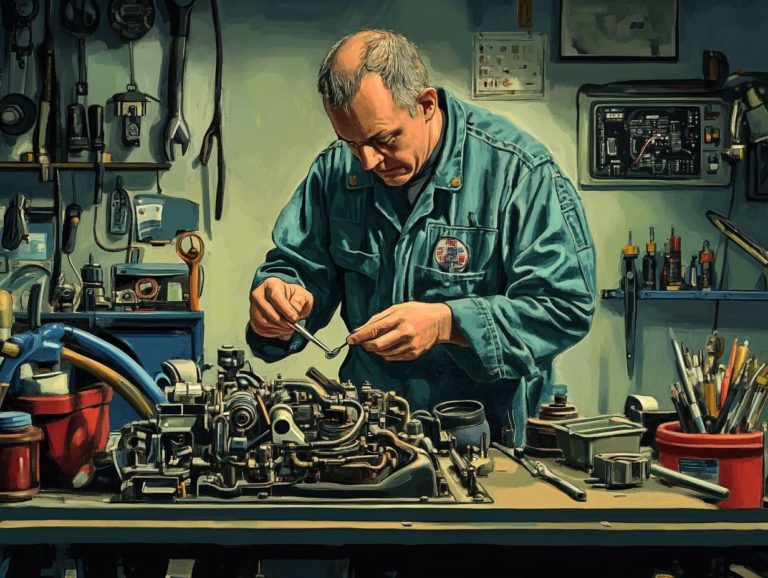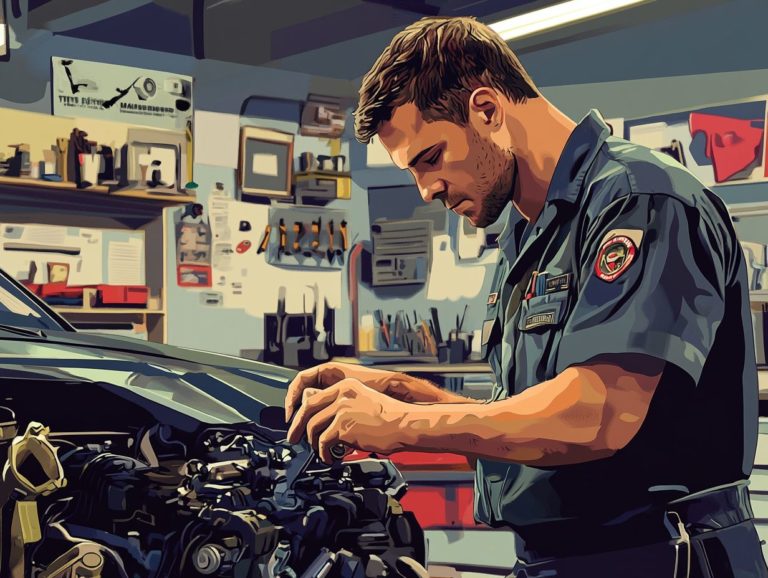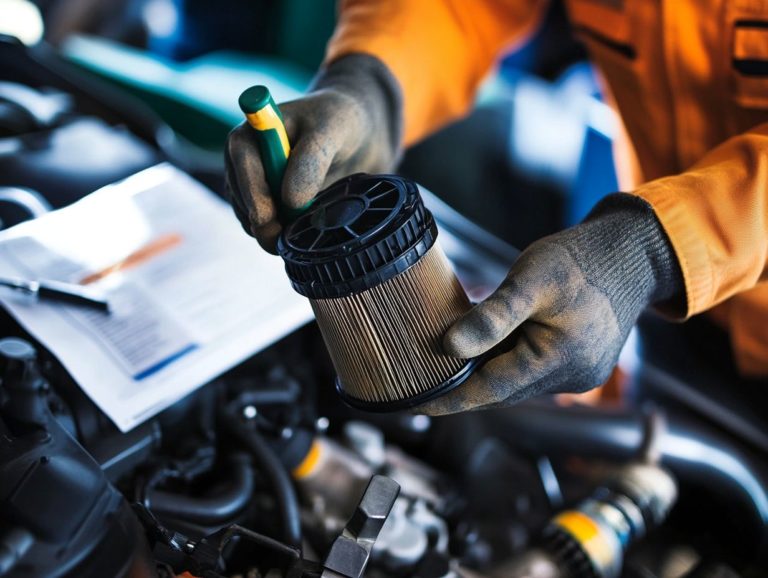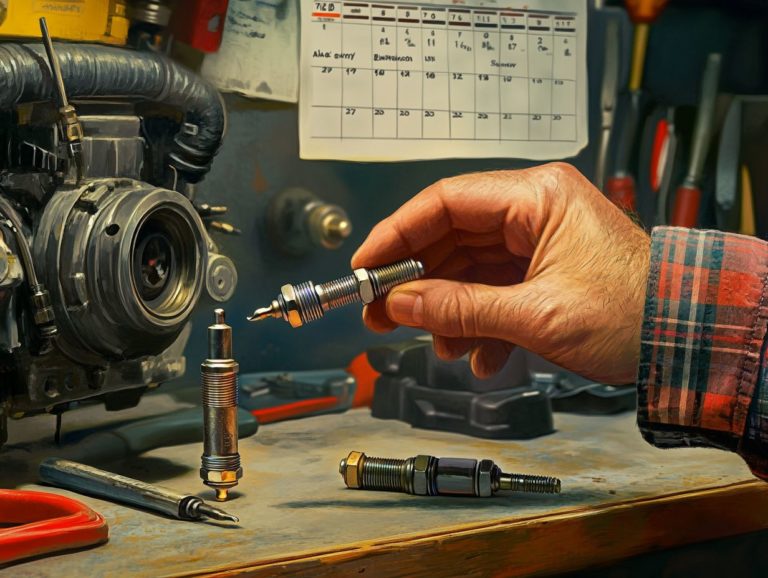5 Tips for Maintaining Older Vehicles
Maintaining an older vehicle presents a rewarding challenge, offering the opportunity to preserve its unique charm while ensuring both longevity and performance.
This guide outlines five essential tips designed to keep your classic ride in peak condition. By regularly checking fluids and staying ahead of routine maintenance, you ll not only enhance your vehicle s longevity but also sharpen your awareness of warning signs.
Investing in quality parts is another crucial step that contributes to a smoother driving experience.
Adopting mindful driving habits can further enhance your efforts. Explore how you can extend the life of your beloved car and enjoy every moment on the road!
Contents
- Key Takeaways:
- 1. Regularly Check and Change Fluids
- 2. Keep Up with Routine Maintenance
- 3. Pay Attention to Warning Signs
- 4. Invest in Quality Parts and Repairs
- 5. Be Mindful of Driving Habits
- What Are the Most Important Fluids to Check and Change Regularly?
- What Are the Common Routine Maintenance Tasks for Older Vehicles?
- Are You Noticing These Warning Signs in Your Older Vehicle?
- How Can Quality Parts and Repairs Benefit an Older Vehicle?
- What Driving Habits Can Help Prolong the Life of an Older Vehicle?
- What Are the Benefits of Maintaining an Older Vehicle?
- Frequently Asked Questions
- 1. What are some important tips for maintaining older vehicles?
- 2. How often should I change the oil in my older vehicle?
- 3. Why is it important to check and replace worn-out parts on older vehicles?
- 4. What routine maintenance should I keep up with on my older vehicle?
- 5. How can I keep the exterior of my older vehicle looking good?
- 6. What warning signs should I watch out for with my older vehicle?
Key Takeaways:
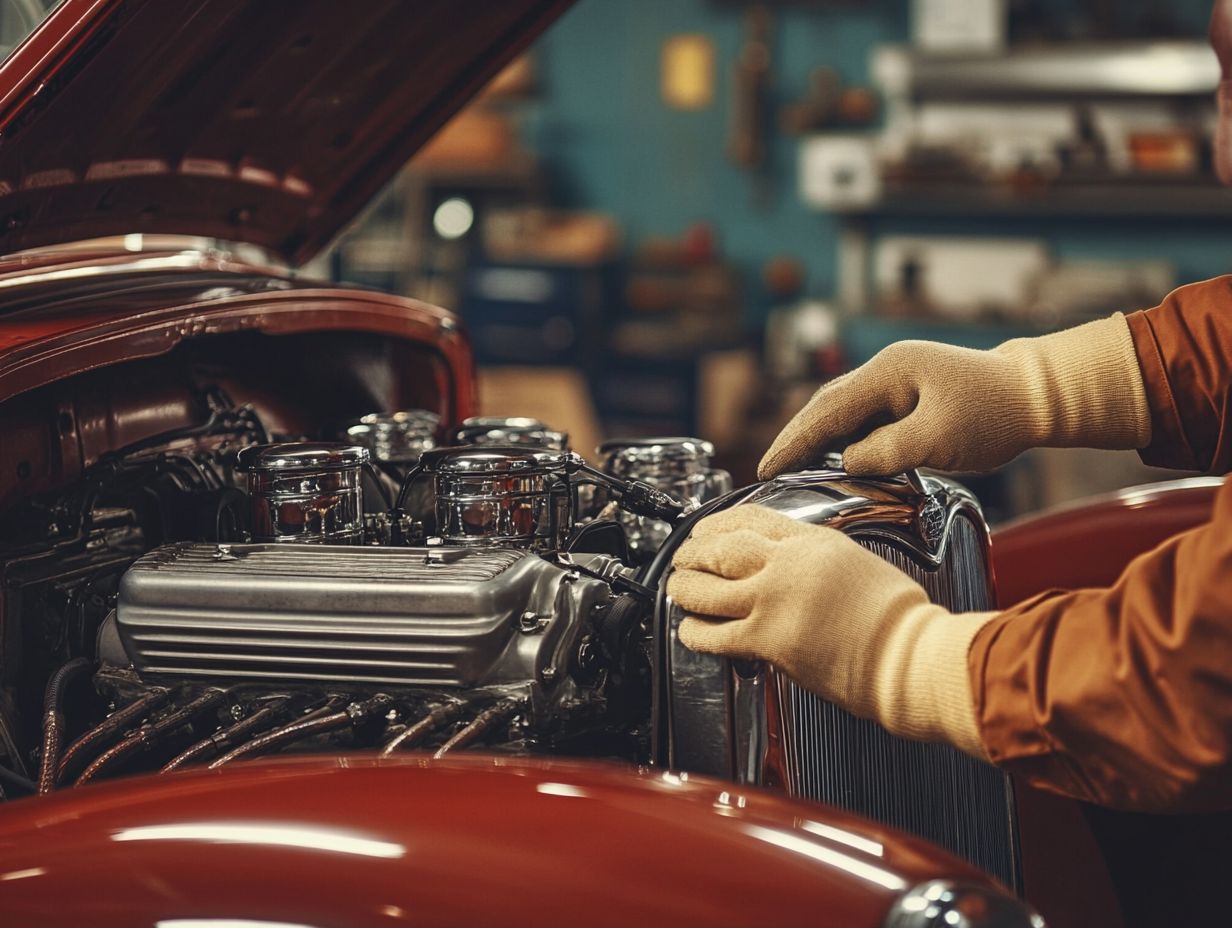
- Regularly checking and changing fluids can extend the life of an older vehicle and prevent costly repairs.
- Performing routine maintenance tasks, such as oil changes and tire rotations, can help keep an older vehicle running smoothly.
- Paying attention to warning signs, such as strange noises or warning lights, can help identify potential issues before they become major problems.
- Investing in quality parts and repairs can save money in the long run and improve the overall performance of an older vehicle.
- Being mindful of driving habits, such as avoiding aggressive driving and following recommended maintenance schedules, can prolong the life of an older vehicle.
1. Regularly Check and Change Fluids
Regularly checking and changing fluids is absolutely essential for maintaining aging vehicles. This practice keeps your car running smoothly and saves you from expensive repairs.
Key fluids to keep an eye on include:
- engine oil
- coolant
- transmission fluid
- brake fluid
- fuel lines
each crucial to your vehicle s overall functionality. This attention to detail is especially important for classic car care, where older components demand a bit more extra care. Neglecting these fluids can lead to diminished engine performance and increased wear on car parts, ultimately impacting both safety and fuel efficiency.
Take engine oil, for instance. It lubricates the moving parts and helps prevent overheating. It s vital to monitor its level and quality, especially as your vehicle ages. Similarly, coolant plays a key role in regulating engine temperature, so checking for leaks or discoloration is a must.
Don t overlook transmission fluid it’s often the unsung hero of smooth gear transitions while brake fluid is pivotal for maintaining stopping power and overall safety.
Regularly check fuel lines for wear or corrosion. To streamline your maintenance routine, consult your owner s manual for specific intervals or mileage recommendations for fluid changes. This proactive approach will enable you to make timely decisions and keep your vehicle running smoothly.
2. Keep Up with Routine Maintenance
Keeping up with routine maintenance is essential for ensuring the safety and reliability of your high-mileage car. It helps you identify potential issues before they balloon into costly repairs.
A comprehensive maintenance schedule should encompass regular checks and replacements of:
- brake pads
- tire rotations
- oil and filter changes
- thorough safety inspections
All of this is aimed at prolonging your vehicle’s longevity and enhancing your driving experience. Committing to this level of care not only improves engine performance but also boosts overall fuel efficiency, making it a wise investment for any vehicle owner.
Addressing minor wear and tear promptly can prevent them from escalating into major problems that require expensive fixes later on. For example, keeping an eye on fluid levels like coolant and transmission oil while checking that belts and hoses are in good condition can significantly enhance your vehicle’s reliability.
Regularly cleaning and treating both the exterior and interior of your older car can also help preserve its value over time. By following these maintenance tips for high-mileage cars, you’ll not only save money through reduced repair costs but also enjoy greater peace of mind on the road, knowing your vehicle is in optimal condition.
Start implementing these tips today and enjoy the ride in your classic vehicle!
3. Pay Attention to Warning Signs
Paying attention to warning signs is essential for keeping your aging vehicle in prime condition. Early detection of issues can help you sidestep more serious problems down the road.
For instance, if you notice a sudden drop in fuel efficiency or persistent vibrations while driving, consider these red flags. They could indicate underlying fuel system or suspension issues. Dashboard alerts, like the pesky check engine light, often signal engine-related problems that shouldn’t be ignored. Strange smells or excessive heat can hint at brake or transmission troubles that demand your urgent attention.
Get professional help immediately when you notice these signs! This not only enhances your vehicle’s longevity but also reduces the risk of accidents or breakdowns. Regular inspections are vital; they give you the chance to tackle minor issues before they snowball into costly repairs or safety hazards.
4. Invest in Quality Parts and Repairs
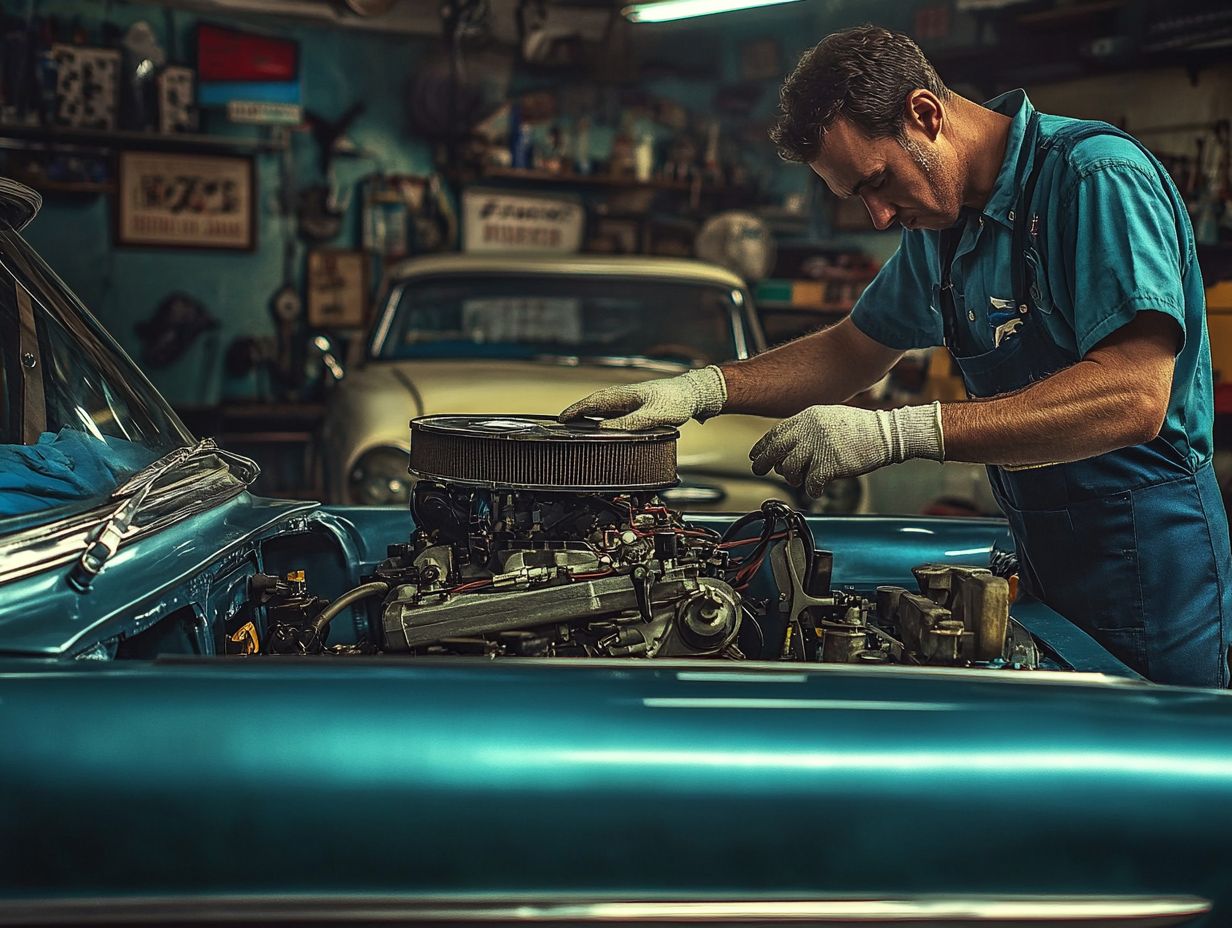
Investing in quality parts and repairs is essential for preserving the integrity and value of older vehicles, especially classic cars that demand specialized care and attention.
When you choose high-grade components like premium brake pads or durable ignition coils, you’re not just enhancing performance; you’re also elevating safety and reliability. For instance, opting for high-quality shock absorbers can significantly improve ride comfort and handling, which is particularly vital for vehicles that have endured years of wear and tear.
Using top-tier gaskets and seals can effectively prevent oil leaks, saving you both time and money on future engine repairs. By committing to quality repairs and components, you can reduce the risk of frequent breakdowns, ultimately leading to substantial savings in maintenance costs over time. Invest in quality parts today for a safer, more enjoyable ride tomorrow!
5. Be Mindful of Driving Habits
Mind your driving habits! They are key to extending your vehicle s life and boosting fuel efficiency.
For example, by accelerating gradually, you not only reduce strain on the engine but also maximize fuel consumption over time. Maintaining a consistent speed during drives especially on highways helps minimize fluctuations that can stress the engine.
This gentle approach aligns perfectly with regular maintenance schedules, ensuring that oil changes and tire rotations occur at optimal intervals. By doing so, you protect vital components and foster a more economical driving lifestyle, resulting in fewer repairs and an enhanced overall driving experience.
Thus, adopting conscientious driving behaviors becomes an essential part of preserving both the integrity of your vehicle and your financial well-being.
What Are the Most Important Fluids to Check and Change Regularly?
The most crucial fluids to check and change regularly in your vehicle include engine oil, coolant (a liquid that helps keep your engine from overheating), brake fluid, transmission fluid, and fuel lines. Each of these plays a vital role in ensuring your vehicle operates at its best and keeps you safe on the road.
By keeping a close eye on these essential fluids, you promote the smooth operation of your engine and sidestep potentially costly repairs in the future. For example, fresh engine oil minimizes friction and wear, while coolant prevents overheating leading to catastrophic engine damage.
Look out for signs that these fluids might need your attention, such as:
- Dark or gritty oil
- Low coolant levels
- A spongy brake pedal
It’s wise to check your engine oil and coolant levels at least once a month and to change these fluids at least twice a year. As your vehicle ages, you may need to monitor them more frequently, especially since older models can be prone to leaks or degradation.
What Are the Common Routine Maintenance Tasks for Older Vehicles?
Common routine maintenance tasks for your older vehicle include tire rotation, oil and filter changes, regular safety inspections, and checking the brake system. These tasks are vital for keeping your car safe and running well. By staying on top of these tasks, you not only enhance the longevity of your high-mileage car but also enjoy a smoother driving experience. To learn more about keeping your classic car in great shape, check out this guide on how to maintain a classic car over time for better fuel efficiency.
Familiarizing yourself with these responsibilities is essential. It contributes to the overall health of your vehicle and can help you avoid costly repairs in the future.
For instance, regularly checking your tire pressure and tread depth is vital. Under-inflated or worn tires can cause dangerous blowouts or decreased traction, especially in inclement weather. Aim to change your oil every 3,000 to 5,000 miles, particularly for older models, to avoid engine wear and maintain peak efficiency. Don t forget to conduct annual safety inspections to ensure that your brakes, lights, and wipers are functioning properly.
Check battery connections regularly, as aging vehicles can suffer from corrosion. This is crucial for reliable starts.
By taking these proactive measures, you not only boost your vehicle’s performance but also gain invaluable peace of mind.
Are You Noticing These Warning Signs in Your Older Vehicle?
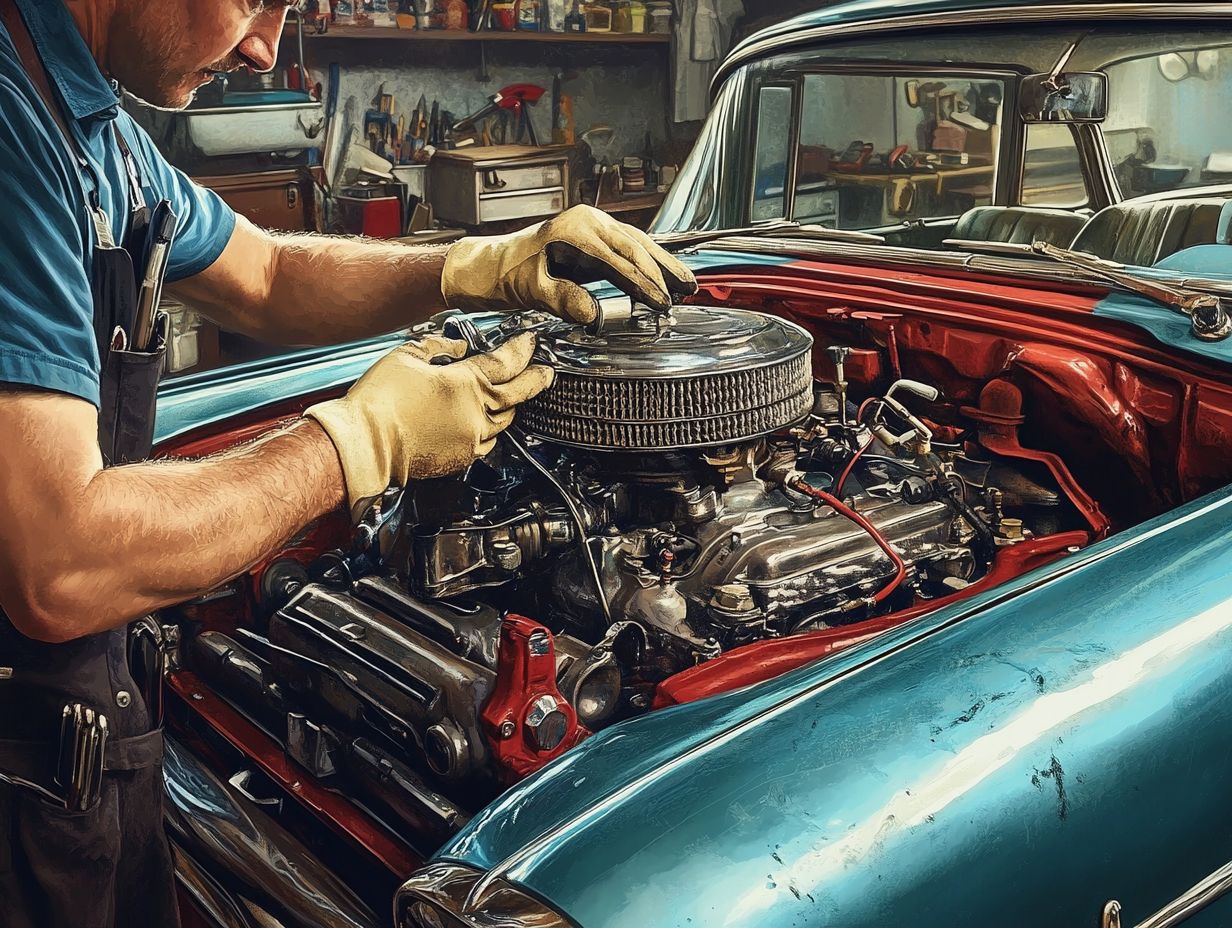
Keep an eye out for warning signs in your older vehicle, such as unusual noises, dashboard warning lights, and changes in handling. These may indicate problems that need fixing.
Paying close attention to these indicators is vital. For instance, if you notice a persistent grinding noise when applying the brakes, it might be time to consider whether your brake pads are worn or if there are more serious problems within the braking system.
Addressing such issues early by consulting a trusted mechanic can significantly enhance your safety and prevent more extensive and costly brake repairs in the future. Likewise, if any dashboard warning lights flicker or stay illuminated, they could indicate serious maintenance needs, like fluid leaks or system malfunctions.
Don t ignore these signs! Regular preventive maintenance can help catch these issues before they escalate, ultimately saving you from future repair costs and protecting your vehicle’s longevity.
How Can Quality Parts and Repairs Benefit an Older Vehicle?
Quality parts and repairs can boost your vehicle s performance, safety, and value especially if you own a classic car that demands specialized care. By choosing reliable car parts during repairs, you ensure that critical components remain dependable, which prolongs the life of your vehicle and helps you avoid expensive collision repairs down the line.
For instance, components like brake systems, ignition parts, and suspensions are essential and should never be compromised. They guarantee smooth operation while promoting safety on the road.
Testimonials from classic car enthusiasts often emphasize the peace of mind that comes with using high-quality parts. One owner shared how a premium brake system didn t just improve stopping distance but transformed the entire driving experience.
Case studies reveal that vehicles maintained with quality repairs tend to appreciate better over time. Investing in excellence is not merely an expense but a strategic move for long-term value retention.
What Driving Habits Can Help Prolong the Life of an Older Vehicle?
Certain driving habits can significantly extend the life of your older vehicle while enhancing its overall efficiency and performance. Gentle acceleration and avoiding harsh braking can reduce wear on key parts. Sticking to speed limits boosts fuel efficiency and maintains engine performance.
Aligning your driving habits with maintenance can help. This leads to a more reliable and enjoyable driving experience. Want to relieve stress on your vehicle? Adopt these mindful strategies!
Using cruise control on the highway helps maintain a steady speed, reducing engine strain and enhancing fuel economy. Planning your routes to minimize stop-and-go traffic can further lessen the wear on brakes and transmission, the part that helps your vehicle change gears.
Integrating these habits into your daily routine might involve setting reminders to drive calmly or exploring less congested routes during peak hours. Additionally, following the top 10 car maintenance tips for beginners can make a notable difference in the longevity of your older vehicle.
What Are the Benefits of Maintaining an Older Vehicle?
Maintaining an older vehicle offers a wealth of benefits, including cost savings, enhanced longevity, and the preservation of classic car value. It’s truly a wise investment for any discerning owner. Regular maintenance not only helps you sidestep costly repairs but also ensures your vehicle operates smoothly. For those looking for efficient solutions, consider these 5 tips for quick common car repairs, extending its usable life.
By embracing advancements in automotive technology, you can make strides in reliability and performance, making the upkeep of high-mileage cars both practical and rewarding.
Beyond financial perks, there’s a unique emotional connection that often develops between you and your older vehicle. Many find joy in the nostalgia and character of these classic models, creating cherished memories and stories that make each drive special.
Let s not overlook the environmental impact; keeping a vehicle on the road longer reduces waste and lessens the demand for new automobiles, which consume significant resources to produce. By keeping your vehicle longer, you’re not just saving money you’re making a positive impact on our planet!
Ultimately, choosing to maintain an older vehicle leads to a deeply fulfilling ownership experience, defined by satisfaction and pride.
Frequently Asked Questions
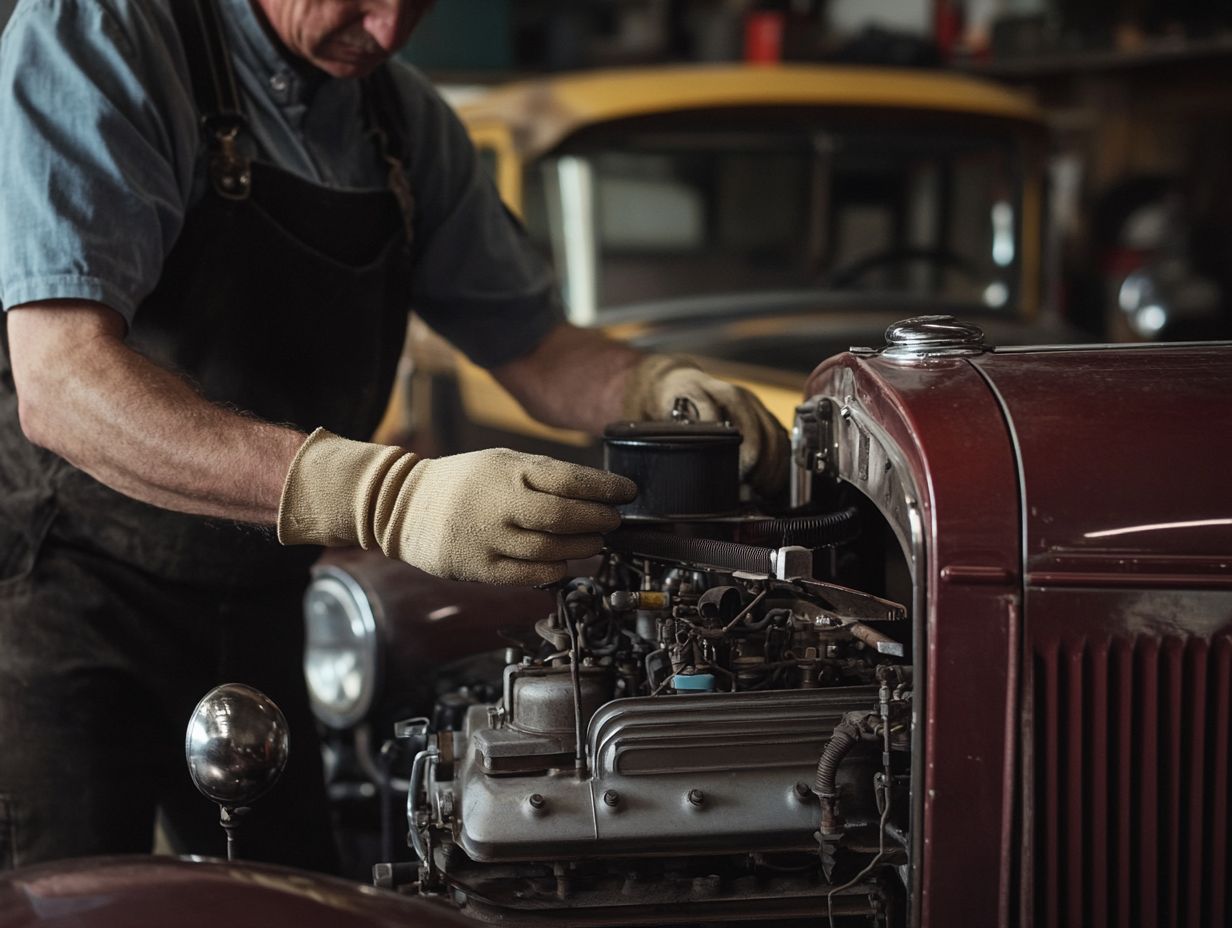
1. What are some important tips for maintaining older vehicles?
Some important tips for maintaining older vehicles include regular oil changes, checking and replacing worn-out parts, keeping up with routine maintenance, cleaning and protecting the exterior, and watching out for any warning signs of potential issues.
2. How often should I change the oil in my older vehicle?
It is recommended to change the oil in your older vehicle every 3,000-5,000 miles or every 3-6 months, depending on your driving habits. This helps keep your engine running smoothly and prevents potential issues.
3. Why is it important to check and replace worn-out parts on older vehicles?
As vehicles age, certain parts may wear out or break down. It is important to check and replace these worn-out parts to prevent safety hazards or further damage to your vehicle.
4. What routine maintenance should I keep up with on my older vehicle?
Some routine maintenance tasks to keep up with on older vehicles include checking and replacing fluids (such as coolant, transmission fluid, and brake fluid), replacing filters, and inspecting your car’s suspension for any signs of wear or damage.
5. How can I keep the exterior of my older vehicle looking good?
To keep the exterior of your older vehicle looking good, regularly wash and wax the paint, protect it from the elements (such as using a car cover), and touch up any scratches or chips to prevent rusting.
6. What warning signs should I watch out for with my older vehicle?
Some warning signs to watch out for with older vehicles include strange noises, vibrations, leaks, and changes in performance or handling. If you notice any of these, it’s important to have your vehicle checked by a mechanic to prevent potential issues from worsening.

